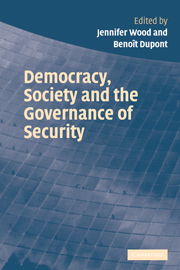Book contents
- Frontmatter
- Contents
- List of contributors
- Foreword
- Acknowledgements
- Introduction: Understanding the governance of security
- 1 Reflections on the refusal to acknowledge private governments
- 2 Transnational security governance
- 3 Two case studies of American anti-terrorism
- 4 Power struggles in the field of security: implications for democratic transformation
- 5 Policing and security as ‘club goods’: the new enclosures?
- 6 The state, the people and democratic policing: the case of South Africa
- 7 Necessary virtues: the legitimate place of the state in the production of security
- 8 From security to health
- 9 Research and innovation in the field of security: a nodal governance view
- Conclusion: The future of democracy
- References
- Index
1 - Reflections on the refusal to acknowledge private governments
Published online by Cambridge University Press: 22 September 2009
- Frontmatter
- Contents
- List of contributors
- Foreword
- Acknowledgements
- Introduction: Understanding the governance of security
- 1 Reflections on the refusal to acknowledge private governments
- 2 Transnational security governance
- 3 Two case studies of American anti-terrorism
- 4 Power struggles in the field of security: implications for democratic transformation
- 5 Policing and security as ‘club goods’: the new enclosures?
- 6 The state, the people and democratic policing: the case of South Africa
- 7 Necessary virtues: the legitimate place of the state in the production of security
- 8 From security to health
- 9 Research and innovation in the field of security: a nodal governance view
- Conclusion: The future of democracy
- References
- Index
Summary
… the writing is on the wall if we refer to historical experience, according to which there is no oppression that is not met with resistance. As for the social and political outcomes of this resistance, uncertainty and experimentation are the only possible assessments, as the process of change muddles through the collective experience of rage, conflict, struggle, hope, failure, and compromise.
(Castells 2000: 128)Introduction
There has been, among many scholars and practitioners, a steadfast refusal to acknowledge the existence of what Macaulay, many years ago, recognized as ‘private governments’ (that is, non-state entities that operate not simply as providers of governance on behalf of state agencies but as auspices of governance in their own right) (Macaulay 1986). These governments, like state governments, authorize and direct activities intended to shape the flow of events (Parker and Braithwaite 2003) so as to promote various governmental outcomes – in distinguishing between auspices and providers of governance I am drawing on Bayley and Shearing (2001). Private governments that engage in steering the flow of events to promote security are, like states, auspices that engage in ‘[purposive strategies] involving the initiation of techniques which are intended to offer guarantees of security’ (Johnston 2000b: 10).
Private governments are now ubiquitous. More importantly, what they do has shaped, and continues to shape, the world fundamentally and dramatically.
- Type
- Chapter
- Information
- Democracy, Society and the Governance of Security , pp. 11 - 32Publisher: Cambridge University PressPrint publication year: 2006
- 46
- Cited by

